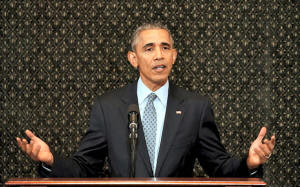|
 Obama,
Southeast Asia leaders eye China and trade at California summit Obama,
Southeast Asia leaders eye China and trade at California summit
 Send a link to a friend
Send a link to a friend
[February 15, 2016]
By Jeff Mason
RANCHO MIRAGE, Calif. (Reuters) -
President Barack Obama will press leaders from Southeast Asia to boost
trade and back common goals for the South China Sea during a summit
starting on Monday that the White House hopes will solidify U.S.
influence in the region.
|
|
 Obama will also discuss curbing North Korea and plans to fight the
Islamic State group during the two-day meeting with Association of
Southeast Asian Nations (ASEAN) at Sunnylands, a California resort. Obama will also discuss curbing North Korea and plans to fight the
Islamic State group during the two-day meeting with Association of
Southeast Asian Nations (ASEAN) at Sunnylands, a California resort.
The visit, at the same location where Obama once hosted Chinese
President Xi Jinping, is designed to demonstrate Washington's
commitment both as a counterweight to Beijing and as an eager
trading partner with ASEAN nations.
It also helps cement a legacy issue for Obama, who has championed a
U.S. pivot to Asia during his presidency and is determined to
present the United States as a Pacific power.
"We want to make very clear that the United States is going to be at
the table and a part of setting the agenda in the Asia- Pacific in
the decades to come," White House deputy national security adviser
Ben Rhodes told reporters last week.
 The first day of the summit is scheduled to focus on economic issues
and trade, including discussion of the Trans-Pacific Partnership
deal, which includes four of the ASEAN members: Vietnam, Singapore,
Brunei and Malaysia.
Others are interested in joining, and the White House wants to make
sure the pact goes into effect.
On Tuesday, the leaders will discuss maritime issues including the
South China Sea, where China and several Southeast Asian states have
conflicting and overlapping claims.
Rhodes said Obama would deliver a tough message to China that
disputes over the area must be resolved peacefully.
[to top of second column] |

"We will continue to underscore the principle that these issues have
to be resolved consistent with international norms and not through
bigger nations bullying smaller ones," he said.
The challenge at the summit may be to get all ASEAN countries to
agree on a strong statement on the issue. Analysts say China has put
pressure on countries such as Cambodia and Laos not to sign on.
Pressure from Obama, and a message that the United States will
continue to engage with the group, may counteract that.
"If the ASEAN leaders feel that the United States is investing in
ASEAN ... that would encourage even the weakest, the most
susceptible ASEAN states to sign on with their brothers to make
these statements," said Ernest Bower, an Asia expert at the Center
for Strategic and International Studies.
"No one in Southeast Asia wants the Chinese to run roughshod over
their smaller neighbors."
(Additional reporting by David Brunnstrom in Washington; Editing by
Paul Tait)
[© 2016 Thomson Reuters. All rights
reserved.]
Copyright 2016 Reuters. All rights reserved. This material may not be published,
broadcast, rewritten or redistributed.
 |